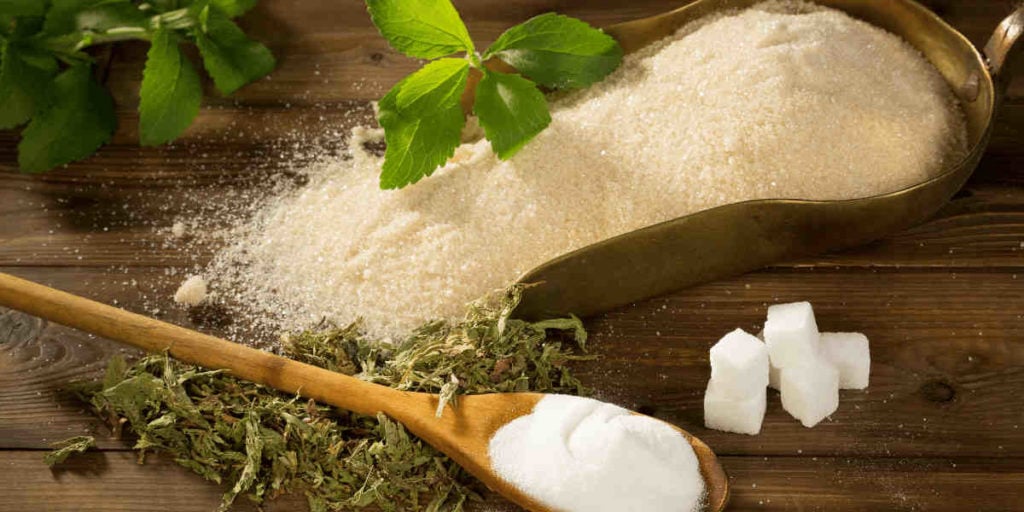Nutrition
Artificial Sweeteners: Safe or Toxic?
Over the recent decades, we’ve become more aware of the harms that come from consuming too much sugar. There could be an argument made that the rising rates of obesity and diabetes are directly related to the amount of sugar that food companies add to our food. So are artificial sweeteners a good alternative?
As we’ve become more conscious of it and have begun avoiding sugar-laden products, companies had jumped on the bandwagon and are slowly starting to remove sugar from their products. And that’s a good thing, right?
In one respect, it’s a great thing because we have more option to choose from when you’re trying avoid consuming too much sugar but when looking at what is being added to these products to substitute for the removed sugar content, it becomes clear that these new sugar-free products may not be any healthier than their original sugar-filled versions.
In general, people like things that taste sweet. Sugar is delicious and if you are used to it when it’s taken out of food, the quality of taste can drop drastically. So, a substitute is needed to make the food more enjoyable. The drawback of the substitutes is that they’re usually man-made substances, or substances that aren’t normally found in a large quantity within food.
5 most common artificial sweeteners
There are five common sugar substitutes that are currently available and can often be found on the ingredients list of food products: aspartame, neotame, acesulfame-K, sucralose, and saccharin.
#1 Aspartame: the most common artificial sweetener
Aspartame – this sweetener is, by far, the most common one used. It can be found in a multitude of diet foods, including diet soda. In recent years, it’s started to fall out of popularity due to health concerns and those concerns are not without merit.
Aspartame is a combination of phenylalanine, aspartic acid, and methanol. Both phenylalanine and aspartic acid have an effect on the brain that can contribute to neurological issues, mood disorders, and memory impairment.
Even more alarming is the fact that phenylalanine is metabolized into diketopiperazine – a known carcinogen. Although there haven’t been any direct links between aspartame and cancer within humans, a 2005 study found that it caused lymphoma and leukemia in rats. A by-product of metabolizing aspartame is formaldehyde, a chemical most widely known as a component of embalming fluid. While it may work wonderfully for embalming, it’s not that great when consumed by the living. According to the National Cancer Institute, formaldehyde is highly carcinogenic and linked to a list of different cancers. (1)

#2 Neotame artificial sweetener: an Aspartame 2.0
Neotame could easily be described as Aspartame 2.0. It is created using the same chemical formula found in aspartame but with 3,3-dimethyl butyraldehyde added into the mix. This addition to the formula was meant to prevent the possible health issues of phenylalanine by hindering it from breaking down after consumption but some health professions believe that neotame could actually be worse than aspartame.
Not only does neotame carry some of the same dangers of aspartame, including producing formaldehyde as a by-product of being metabolized, but 3,3-dimethylbutyraldehyde isn’t exactly a healthy substance either. It’s highly flammable and known as an irritant that could potentially cause skin, eye, respiratory issues. (2)
#3 Sucralose: an artificial sweetener made of sugar?
Unlike the other sweeteners on this list, sucralose is actually made from sugar. It is created by chlorinating sugar through an industrial process.
The danger of sucralose comes from the chlorine used in that process. Despite claims that the type of chlorine in sucralose is harmless and similar to that found in table salt, the chemical structure more closely resembles that of the chlorine type found in dichlorodiphenyltrichloroethane (DDT), which is a pesticide that has been banned in many countries due to being highly toxic and having the potential to cause cancer
Sucralose has also been reported to have a few side effects that include headaches, dizziness, muscle aches, digestive issues, skin irritation, and increased inflammation.
#4 Saccharin – a sweetener that can raise blood sugar levels?
Made of benzoic sulfmide, saccharin was once suspected of causing bladder cancer due to the results of studies conducted in the 1970’s. These studies showed that the rates of bladder cancer rose in rats that were fed saccharin.
However, follow-up studies came to the conclusion that the mechanism with which saccharin promoted cancer formation in rats did not occur in humans because of biological differences. Although saccharin may not be carcinogenic, it is not without its dangers.
Despite being used as a sugar substitute, the benefits of cutting out sugar might not be valid when it comes to saccharin. There has been some evidence that this sweetener actually raises blood glucose levels, leading to effects that are similar to those of sugar consumption. Because of the health concerns associated with saccharin, it has been advised that infants, children, and pregnant women refrain from consuming it.
#5 Acesulfame – K sweetener
Acesulfame – K This sweetener is a mixture of potassium salt and methylene chloride. As a carcinogen, the inclusion of methylene chloride is worrisome. Much like with aspartame, there hasn’t been an observed link between this sweetener and human cancers but the studies are heavily debated. There have been implications that the studies were not conducted in a method that would lead to a conclusive finding.
Cancer experts have spoken out against the classification of Acesulfame -K as a safe food additive. Martin Schneiderman, the former Associate Director of Field Studies and Statistic at the National Cancer Institute, stated “I find the actual studies and the data analysis seriously flawed. New tests, properly designed, executed, and analyzed are needed. The usual consequences of poor tests is to make it harder to find any effects. Despite the low quality of the studies reported to you, I find that there is evidence of carcinogenicity.”
Schneiderman’s opinion is backed up by the statements of Franklin E. Mirer, a member of the Board of Scientific Counselors of The National Toxicology Program.
In regard to the research findings on Acesulfame-K, he concluded “These studies are inadequate to assess the carcinogenic potential of the compound. In the face of inadequate study design and conduct, which would tend to obscure a carcinogenic effect if it were there, nevertheless there was at least equivocal evidence for carcinogenic activity in several studies.”
So, even though the studies haven’t officially linked this sweetener to cancer, there’s still plenty of reason to be wary of it. Are there any safe sugar substitutes?
Is any artificial sweetener healthy?
In general, natural sweeteners are the healthiest but all sugar substitutes have drawbacks. Many substitutes are vastly sweeter than sugar. This is good because you to use less of it but it could lead to your body craving sweeter things and not finding food to be sweet enough. As with everything else in a healthy diet, natural sweeteners need to be consumed in moderation.

What is the healthiest sugar substitute?
However, in comparison to the health issues of the artificial sweeteners mentioned above, this drawback isn’t that bad. There are currently two natural sweeteners that can be found easily in the grocery store and may be a healthy alternative to artificial sugar substitutes. So rather than looking for the safest artificial sweetener, just go natural!
#1 Is Stevia a good sugar substitute?
Pure stevia is entirely natural. It’s extracted from the leaf of the stevia plant and is extremely sweet. Although it’s one of the safer sugar substitutes and has been shown to have additional health benefits when it comes to lowering blood sugar and blood pressure, it still has to be consumed in moderation because large doses may negate the positive aspects of stevia.
There is some concern that it could interfere with certain medications at larger doses but does not appear to pose any risk when not consumed in excess.
#2 Is Monk Fruit really that healthy?
Also known as Luo Han Guo, monk fruit has been used for centuries in Asia. It’s created from the juice of the monk fruit and to date, it has no known side effects. Due to being fairly new on the commercial market, there haven’t been many human studies conducted on the effects of monk fruit being used as a sweetener but animal studies have shown that consumption-led to improvement in blood glucose levels and lipid profiles in diabetic rats.
More research needs to be conducted to determine if these benefits will occur in humans as well but the current results are promising. Unlike the majority of other sweeteners on this list, monk fruit does not seem to be toxic at any level, making it the safest sugar substitute currently available.
References
1. Formaldehyde and Cancer Risk. (2011, June 10). Retrieved February 02, 2016, from https://www.cancer.gov/about-cancer/causes-prevention/risk/substances/formaldehyde/formaldehyde-fact-sheet
2. Neotame: An Artificial Sweetener More Toxic Than Aspartame. (n.d.). Retrieved February 02, 2016, from http://articles.mercola.com/sites/articles/archive/2012/03/28/neotame-more-toxic-than-aspartame.aspx Saccharin. (n.d.). Retrieved February 02, 2016, from http://www.diabetes.co.uk/sweeteners/saccharin.html
3. Sample Quotes From Cancer Experts’ Letter On Acesulfame Testing. (n.d.). Retrieved February 02, 2016, from http://www.cspinet.org/reports/asekquot.html Soffritti, M., Belpoggi, F., Esposti, D. D., & Lambertini, L. (2005). Aspartame induces lymphomas and leukaemias in rats a. European Journal of Oncology,10(2), 107-116. Retrieved February 2, 2016.



